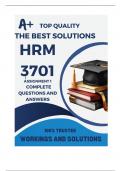,HRM3701 Assignment 1 COMPLETE ANSWERS)
Semester 2 2024 (585848) - DUE 26 August 2024 ;
100% TRUSTED Complete, trusted solutions and
explanations.
Operational context NOVA Economics is a specialist economic
and development consulting firm which employs 120 people,
the consultants are all economists, financial analysts and
computer scientists. Most of the staff are between their 30s
and mid-40s many with master’s degrees and some with PhDs.
Founded in 2002, NOVA Economics provides clients with the in-
depth expertise and analysis necessary to make the right
choices. The consultants combine a deep understanding of the
Southern African business and policy context with specialist
skills in international trade, public policy and regulation,
competition economics and climate change. The work is very
technical, involving large amounts of data analysis. Where
NOVA Economics does not have specialist skills in-house, the
consulting firm was able to draw on a network of local experts
and academics as well as their strategic business partners in
Australia and Europe. Before lockdown, staff were used to
remote videoconferencing with clients, and company policy
allowed working from home one day a week, but this wasn’t
particularly commonplace. The Managing Director Yash
Ramkolowan commented that ‘even if once a week someone
would work from home, the rest of the team would be in the
office, so it did have the feeling that most people were in the
office most of the time.’ In terms of flexible hours, there was
, already a culture of flexing the start and end of the day, both for
work–life balance needs and to enable meetings with “THEIR”
clients in different time zones. While some staff made use of
this, many also worked traditional office hours, and core hours
of 11.00 to 15.00 were in place. The type of knowledge work
done by NOVA Economics could hardly be better suited to
working from home, or indeed to flexing hours; as Yash
commented: ‘In terms of our client needs, there isn’t any
specific need to be in the office or producing from very set
hours. A lot of the work that we do is quite internally focused.’
The consultants’ work is also mostly highly plannable: they
speak regularly to clients but have a good deal of autonomy
over when those calls take place. However, when the pandemic
enforced total, five-days-a-week homeworking, something was
lost from team communication. Head of HR Kate Dabula
commented: ‘There is no substitute for that soft social
interaction that happens by default, when you are in the office
together. There’s something that just isn’t the same, and we
haven’t found that magic button to replace it yet.’ Even for
extremely motivated, high-performing knowledge workers who
are ‘really engaged in the subject matter’ Kate said, ‘Some of
that energy that you get from being together as a team, it’s
much harder to replicate when you’re at home. However, I am
surprised that it is not impacting on their work. The deadlines
still get met, the quality of work is there, but there’s a sort of
energy around it, an excitement, a feeling, when you’re in the
office. We noticed a slump. There was also an impact on





